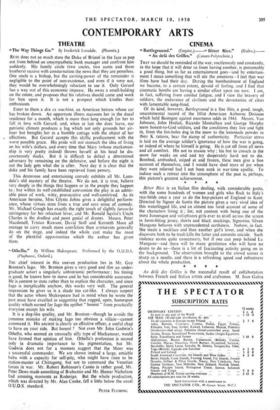CONTEMPORARY ARTS
THEATRE
"The Way Things Go." By Frederick Lonsdale. (Phoenix.) RUIN does not so much stare the Duke of Bristol in the face as pop out from behind an unsympathetic bank manager and confront him suddenly. His family circle (two uncles, two aunts and three brothers) receive with consternation the news that they are penniless. One uncle is a bishop, but the earning-power of the remainder is negligible to the point of non-existence, and even if it were not, they would be overwhelmingly reluctant to use it. Only Gerard has a way out of this economic impasse. He owns a small-holding on the estate, and proposes that his relatives should come and work for him upon it. It is not a prospect which kindles their enthusiasm.
Enter to them a dea ex machina, an American heiress whose car has broken down. An opportune illness maroons her in the ducal residence for a month, which is more than long enough for her to fall in love with Gerard, and, when at last she does leave, our patriotic climate produces a fog which not only grounds her air- liner but benights her in a humble cottage with the object of her
• affections. But Gerard accepts this idyllic predicament with the worst possible grace. His pride will not stomach the idea of living on his wife's dollars, and every time that Mary (whose marksman- ship is very pretty indeed) 'throws herself at his head he dis- courteously ducks. But it is difficult to defeat a determined adversary by remaining on the defensive, and before the night is out the lady gets what she is after. Next day it is clear that the duke and his family have been reprieved from penury.
This dexterous and entertaining comedy exhibits all Mr. Lons- dale's old mastery of the theatre. We do not, it is true, believe very deeply in the things that happen or in the people they happen to ; but within its well .established convention the play is an admir- able piece of work, witty, provocative and well-contrived. As its American heroine, Miss Glynis Johns gives a delightful perform- ance, whose virtues .stem from a true and sure sense of comedy. Mr. Michael Gough has exactly the right touch of slightly farouche astringency for her reluctant lover, and Mr. Ronald Squire's Uncle Charles is the drollest and most genial of drones. Messrs. Peter Macdonell, Tristan Rawson, David Stoll and Kenneth More all manage to carry much more convrction than aristocrats generally do on the stage, and indeed the whole cast make the most of the plentiful opportunities which the author has given them.


































 Previous page
Previous page